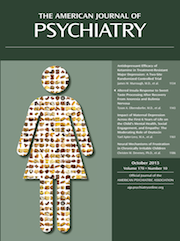Neural Mechanisms of Frustration in Chronically Irritable Children
Abstract
Objective
Irritability is common in children and adolescents and is the cardinal symptom of disruptive mood dysregulation disorder, a new DSM-5 disorder, yet its neural correlates remain largely unexplored. The authors conducted a functional MRI study to examine neural responses to frustration in children with severe mood dysregulation.
Method
The authors compared emotional responses, behavior, and neural activity between 19 severely irritable children (operationalized using criteria for severe mood dysregulation) and 23 healthy comparison children during a cued-attention task completed under nonfrustrating and frustrating conditions.
Results
Children in both the severe mood dysregulation and the healthy comparison groups reported increased frustration and exhibited decreased ability to shift spatial attention during the frustration condition relative to the nonfrustration condition. However, these effects of frustration were more marked in the severe mood dysregulation group than in the comparison group. During the frustration condition, participants in the severe mood dysregulation group exhibited deactivation of the left amygdala, the left and right striatum, the parietal cortex, and the posterior cingulate on negative feedback trials, relative to the comparison group (i.e., between-group effect) and to the severe mood dysregulation group’s responses on positive feedback trials (i.e., within-group effect). In contrast, neural response to positive feedback during the frustration condition did not differ between groups.
Conclusions
In response to negative feedback received in the context of frustration, children with severe, chronic irritability showed abnormally reduced activation in regions implicated in emotion, attention, and reward processing. Frustration appears to reduce attention flexibility, particularly in severely irritable children, which may contribute to emotion regulation deficits in this population. Further research is needed to relate these findings to irritability specifically, rather than to other clinical features of severe mood dysregulation.



